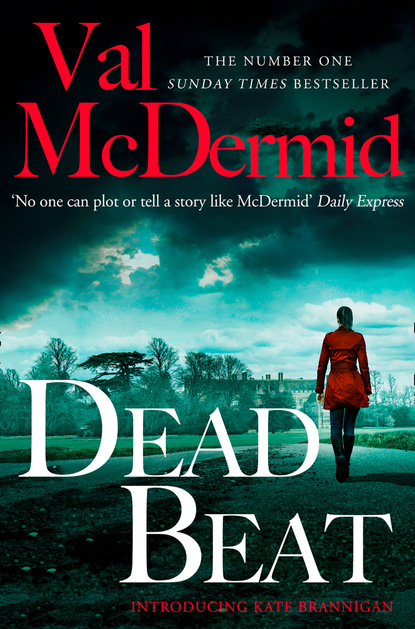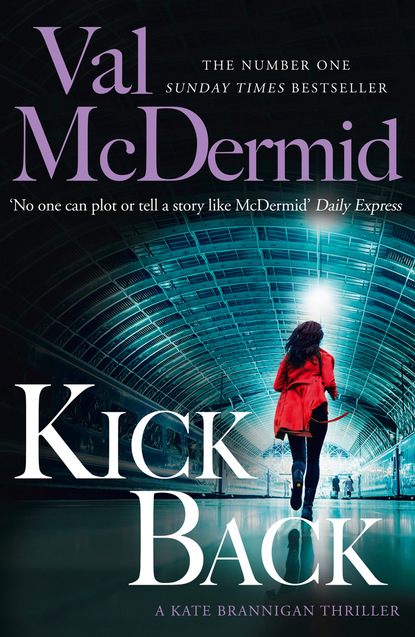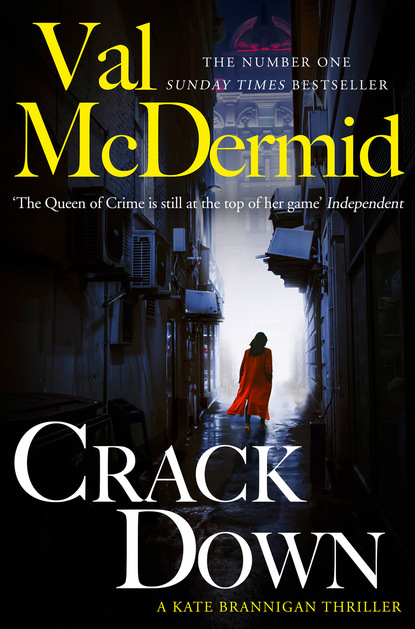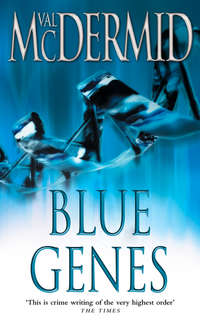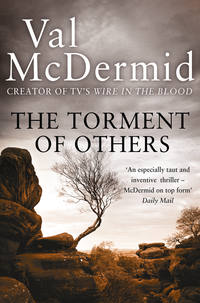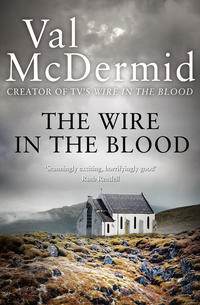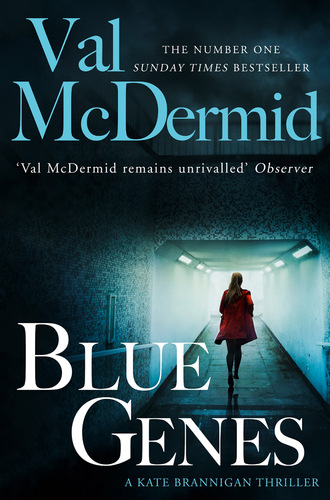
Полная версия
Blue Genes
Richard looked astonished, his big tortoiseshell glasses slipping down his nose faster than Eddie the Eagle on a ski jump. ‘And what about this place?’ he wailed, waving his arm at the neat and tidy room.
‘Out of the goodness of my heart, I’m not going to demand the ten quid an hour that good industrial cleaners get,’ I said sweetly, getting up and tossing the empty tinfoil containers into plastic bags.
‘What about killing me off?’ he demanded, his voice rising like a Bee Gee. ‘How do you think I felt, coming home to find my partner sitting discussing my gravestone with a complete stranger? And while we’re on the subject, I hope you weren’t going to settle for some cheap crap,’ he added indignantly.
I finished what I was doing and moved across to the sofa. ‘Richard, behave,’ I said, slipping my legs over his, straddling him.
‘It’s not very nice, being dead,’ he muttered as my mouth descended on his.
Eventually, I moved my lips along his jaw, tongue flickering against the angle of the bone. ‘Maybe not,’ I said softly, tickling his ear. ‘But isn’t resurrection fun?’
Richard barely stirred when I left his bed next morning just after seven. I scribbled, ‘Gone 2 work, C U 2night?’ on a Post-It note and stuck it on the forearm that was flung out across the pillow. I used to write messages straight on to his arm with a felt-tip pen until he complained it ruined his street cred to have ‘Buy milk’ stencilled indelibly across his wrist. Nothing if not sensitive to people’s needs, I switched to Post-Its.
Back in my own home, I stood under the shower, taking my first opportunity to consider Alexis’s ballistic missile. I knew that having a baby had climbed to the top of her and Chris’s partnership agenda now that they had put the finishing touches to their house on the edge of the Pennines, but somehow I hadn’t realized parenthood was quite so imminent a project. I’d had this mental picture of it being something that would rumble on for ages before anything actually happened, given that it’s such a complicated business for lesbian couples to arrange.
First they’ve got to decide whether they want an anonymous donor, in which case their baby could end up having the same father as half the children of lesbians in the Greater Manchester area, with all the potential horrors that lines up for the future.
But if they decide to go for a donor they know, they’ve got to be careful that everyone agrees in advance what his relationship to the child is going to be. Then they’ve got to wait while he has two AIDS tests with a gap of at least six months in between. Finally, they’ve got to juggle things so that sperm and womb are in the same place at the optimum moment. According to Alexis, it’s not like a straight couple where the woman can take her temperature every five minutes till the time is right then seize her bloke by the appropriate body part and demand sex. So I’d been banking on a breathing space to get used to the idea of Chris and Alexis as parents.
I’ve never been smitten with the maternal urge, which means I always feel a bit bemused when my friends get sandbagged by their hormones and turn from perfectly normal women into monomaniacs desperate to pass their genes on to a waiting world. Maybe it’s because my biological clock has still got a way to go before anything in my universe starts turning pumpkin-shaped. Or maybe, as Richard suggests when he’s in sentimental father mode, it’s because I’m a cold-hearted bastard with all the emotional warmth of Robocop. Either way, I didn’t want a child and I never knew if I was saying the right thing to those who did.
Selfishly, my first thought was for the difference it was going to make to my life. Alexis is my best friend. We go shopping for clothes together. We play seriously competitive and acrimonious Scrabble games together. When Chris and Richard aren’t there to complain about the results, we concoct exotic and bizarre snacks (oatcakes with French mayonnaise and strawberry jam; green banana, coconut and chicken curry …) and wash them down with copious amounts of good vodka. We pick each other’s brains and exploit each other’s contacts. Most of all, we’re there for each other when it counts.
As the hot water cascaded over me, I felt like I was already in mourning for the friendship. Nothing was ever going to be the same again. Alexis would have responsibilities. When Chris’s commitments as a partner in a firm of community architects took her out of town, Alexis would be shackled without time off for good behaviour. Instead of hanging out with me after work, she’d be rushing home for bathtime and nursery tea. Her conversation would shrink to the latest exploits of the incredible child. And it would be incredible, no two ways about it. They always are. There would be endless photographs to pore over. Instead of calling me to say, ‘Get down here, girl, I’ve just found a fabulous silk shirt in your size in Kendal’s sale,’ Alexis would be putting the child on the phone to say, ‘Wo, gay,’ and claiming it as ‘Hello, Kate’. Worst of all, I had this horrible suspicion I was going to become Auntie Kate. Even Richard’s son Davy has never tried to do that to me.
I rinsed the last of the shampoo out of my auburn hair and stepped out of the shower. At least I didn’t have to live under the same roof as it, I thought as I towelled my head. Besides, I told myself, nothing healthy stays the same. Friendships change and grow, they shift their emphases and sometimes they even die. ‘Everything must change,’ I said out loud. Then I noticed a grey hair. So much for healthy change.
I brushed my hair into the neat bob I’ve opted for recently. Time to get my brain into gear. I knew where I needed to go next on Dan and Lice’s problem, but that was a source that might take a little time and a lot of deviousness to tap. More straightforward was a visit to the dark side of the moon.
Gizmo is one of my silver linings. The cloud was a Telecom engineer that I’d had a brief fling with. He’d caught me at one of those weak moments when you kid yourself into believing a nice smile and cute bum are a reasonable basis for a meaningful relationship. After all, if it’s a good enough principle for most of the male population … His lectures on telephone technology had been mildly interesting the first time round. After a month of them, there wasn’t a court in the land that would have convicted me of anything other than self-defence if I’d succumbed to the temptation of burying a meat cleaver in his skull. But he had introduced me to Gizmo, which gave me something good to remember him by.
If Judy Garland was born in a trunk, Gizmo was born in an anorak. In spite of having the soul of a nerd, he had too much attitude for the passivity of train spotting. So he became a computer whizz. That was back in the steam age of computers, when the most powerful of machines took so long to scroll to the end of a ten-page document that you could go off and drip a pot of filter coffee without missing a thing. When 99.99% of the population still thought bulletin boards were things you found on office walls, Gizmo was on line to people all over the world. The teenagers who invented phone phreaking and hacking into the Pentagon were close personal friends of his. He’d never met them, you understand, just spent his nights typing his end of conversations with them and like-minded nutters all over the planet.
When the FBI started arresting hackers and phreakers on the grounds that America has never known what to do with nonconformists, and the British police started to take an interest, Gizmo decided it was time to stop playing Butch Cassidy and the Sundance Kid and come out into the sunlit uplands. So he started working for Telecom. And he manages to keep his face straight when he tells people that he’s a computer systems manager there. Which is another way of saying he actually gets paid to keep abreast of all the information technology that allows him to remain king of the darkside hackers. Gizmo’s like Bruce Wayne in reverse. When darkness falls on Gotham City, instead of donning mask and cape and taking on the bad guys, Gizmo goes on line and becomes one of the growing army who see cyberspace as the ultimate subversive, anarchic community. And Telecom still haven’t noticed that their northern systems manager is a renegade. It’s no wonder none of Gizmo’s friends have Telecom shares.
If I had to pick one thing that demonstrates the key difference between the UK and the USA, it would be their attitudes to information. Americans get everything unless there’s a damn good reason why not. Brits get nothing unless a High Court judge and an Act of Parliament have said there’s a damn good reason why we should. And private eyes are just like ordinary citizens in that respect. We don’t have any privileges. What we have are sources. They fall into two groups: the ones who are motivated by money and the ones who are driven by principle. Gizmo’s belief that information is born free but everywhere is in chains has saved my clients a small fortune. Police records, driver and vehicle licensing information, credit ratings: they’re all there at his fingertips and, for a small donation to Gizmo’s Hardware Upgrade Fund, at mine. The only information he won’t pass on to me is anything relating to BT phone bills or numbers. That would be a breach of confidence. Or something equally arbitrary. We all have to draw the line somewhere.
I draw it at passing Gizmo’s info on to clients. I use him either when I’ve hit a dead end or I know he can get something a lot faster than I can by official routes, which means the client saves money. I know I can be trusted not to abuse that information. I can’t say the same about the people who hire me, so I don’t tell them. I’ve had people waving wads of dosh under my nose for an ex-directory phone number or the address that goes with a car licence plate. Call me a control freak, but I won’t do that kind of work. I know there are agencies who do, but that doesn’t keep me awake at night. The only conscience I can afford to worry about is my own.
Gizmo had recently moved from a bedsit in the busiest red-light street in Whalley Range to a two-bedroomed flat above a shop in Levenshulme, a stretch of bandit country grouped around Stockport Road. The shop sells reconditioned vacuum cleaners. If you’ve ever wondered where Hoovers go when they die, this is the place. I’ve never seen a customer enter or leave the place, though there’s so much grime on the windows they could be running live sex shows in there and nobody would be any the wiser. And Gizmo reckons he’s moved up in the world.
I was going against the traffic flow on the busy arterial road, so it didn’t take me long to drive the short distance to Levenshulme and find a parking space on a side street of red-brick terraces. I pressed the bell and waited, contemplating a front door so coated with inner-city pollution that it was no longer possible to tell what colour it had originally been. The only clean part of the door was the glass on the spyhole. After about thirty seconds, I pressed the bell again. This time, there was a thunder of clattering feet, a brief pause and then the door opened a cautious couple of inches. ‘Kate,’ Gizmo said, showing no inclination to invite me in. His skin looked grey in the harsh morning light, his eyes red-rimmed like a laboratory white rat.
‘All right, Giz?’
‘No, since you ask.’ He rubbed a hand along his stubbled jaw and scratched behind one ear with the knuckle of his index finger.
‘What’s the problem? Trouble with the Dibble?’
His lips twisted in the kind of smile dogs give before they remove your liver without benefit of anaesthetic. ‘No way. I’m always well ahead of the woodentops. No, this is serious. I’ve got the bullet.’
‘From Telecom?’
‘Who else?’
I was taken aback. The only thing I could think of was that someone had got wise to Gizmo’s extra-curricular activities. ‘They catch you with your hand in somebody’s digital traffic?’
‘Get real,’ he said indignantly. ‘Staff cuts. The section head doesn’t like the fact that I know more than anybody else in the section, including him. So it’s good night Vienna, Gizmo.’
‘You’ll get another job,’ I said. I would have found it easier to convince myself if I hadn’t been looking at him as I spoke. As well as the red-rimmed eyes and the stubble, a prospective employer had to contend with a haircut that looked like Edward Scissorhands on a bad hair day, and a dress sense that would embarrass a jumble sale.
‘I’m too old.’
‘How old?’
‘Thirty-two,’ he mumbled with a suspicious scowl, as if he thought I was going to laugh. I didn’t have enough years on him for that.
‘You’re winding me up,’ I said.
‘The guys who do the hiring are in their forties and scared shitless that they’re going to get the tin handshake any day now, and they know nothing about computer systems except that someone told them it’s a young man’s game. If you’re over twenty-five, twenty-seven if you’ve got a PhD, they won’t even look at your CV. Believe me, Kate, I’m too old.’
‘What a bummer,’ I said, meaning it.
‘Yeah, well. Shit happens. But it’s nicer when it happens to somebody else. So what did you come round for? Last orders before I have to put my rates up?’
I handed him the piece of paper where I’d noted Will Allen’s licence plate. ‘The name and address that goes with the car.’
He didn’t even look at it. He just said, ‘Some time this afternoon,’ then started to close the door.
‘Hey, Giz?’ He paused. ‘I’m really sorry,’ I said. He nodded and shut the door.
I walked back towards the street where I’d parked the zippy Rover 216 that Mortensen and Brannigan had bought for me a couple of months before. Until then, I’d been driving a top-of-the-range sports coupé that we’d taken in part payment for a long and complicated car-finance fraud case, but I’d known in my heart of hearts it was far too conspicuous a set of wheels for the kind of work I do. Given how much I enjoy driving, it had been a wrench to part with it, but I’d learned to love the Rover. Especially after my mate Handbrake had done something double wicked to the engine which made it nippier than any of its German siblings from BMW.
As I rounded the corner, I couldn’t believe what I saw. There was a spray of glittering glass chunks like hundreds of tiny mosaic tiles all over the pavement by the driver’s door of the Rover. The car was twenty yards from the main road, it was half past eight in the morning and I’d been gone less than ten minutes, but someone had had it away on their toes with my stereo.
4
It took me an hour and a half round at Handbrake’s backstreet garage to get a new window and stereo cassette. I knew the window had come from a scrapyard, but it would have been bad manners to ask about the origins of the cassette. I wouldn’t have been entirely surprised if my own deck had arrived in the bike pannier of one of the young lads who supply Handbrake with spare parts as an alternative to drug-running round Moss Side, but it clearly wasn’t my lucky day and I had to settle for a less sophisticated machine. While that might increase the shelf life of my new driver’s-door window, it wouldn’t improve the quality of my life in Manchester’s orbital motorway traffic jams, so I wasn’t in the best of moods when I finally staggered through the door of the office just after ten.
I knew at once that something was badly wrong. Shelley, our office manager, made no comment about my lateness. In all the years I’ve been working with her, she’d never before missed the opportunity to whip me into line like one of her two teenage kids. I’d once found her son Donovan, a six-foot three-inch basketball player, engineering student and occasional rapper with a local band, having to give up a weekend to paint my office because he hadn’t come home till four in the morning. After that, I’d always had a good excuse for being late into work. But this morning, she scarcely glanced up from her screen when I walked in. ‘Bill’s in,’ was all she said.
Worrying. ‘Already? I thought he only flew in yesterday afternoon?’
Shelley’s lips pursed. ‘That’s right,’ she said stiffly. ‘He said to tell you he needs a word,’ she added, gesturing with her head towards the closed door of my partner’s office. Even more worrying. Shelley is Bill’s biggest fan. Normally when he returns from one of his foreign security consultancy trips, we all sit around in the outside office and schmooze the morning away over coffee, catching up. Bill’s a friendly soul; I’d never known him to hide behind a closed door unless he needed absolute peace and quiet to work out some thorny computer problem.
I tapped on the door but didn’t wait for an answer before I opened it and walked in on the sort of scene that would have been more appropriate in the new Dancehouse a few doors down Oxford Road. Bill Mortensen, a bearded blond giant of a man, was standing behind his desk, leaning over a dark woman whose body was curved back under his in an arc that would have had my spine screaming for mercy. One of Bill’s bunch-of-bananas hands supported the small of her back, the other her shoulders. Unlike the ballet, however, their lips were welded together. I cleared my throat.
Bill jumped, his mouth leaving the woman’s with a nauseating smack as he straightened and half turned, releasing his grip on the woman. Just as well her arms were wrapped round his neck or she’d have been on the fast track to quadriplegia. ‘Kate,’ Bill gasped. His face did a double act, the mouth smiling, the eyes panicking.
‘Welcome back, Bill. I wasn’t expecting to see you this morning,’ I said calmly, closing the door behind me and making for my usual perch on the table that runs along one wall.
Bill stuttered something about wanting to see me while the woman disentangled herself from him. She was a good six inches taller than my five feet and three inches. Strike one. Her hair was as dark as Bill’s was blond, cut in the sort of spiky urchin cut I’d recently abandoned when even I’d noticed it was getting a bit passé. On her, it looked terrific. Strike two. Her skin was burnished bronze, an impossible dream for those of us with the skin that matches auburn hair. Strike three. I didn’t have the faintest idea who Bill’s latest companion was, but I hated her already. She grinned and moved towards me, hand stuck out in front of her with all the enthusiasm of an extrovert teenager who hasn’t been put down yet. ‘Kate, it’s great to meet you,’ she announced in an Australian accent that made Crocodile Dundee sound like a BBC newsreader. ‘Bill’s told me so much about you, I feel like I know you already.’ I tentatively put out a hand which she gripped fervently and pumped up and down. ‘I just know we’re going to be mates,’ she added, clapping her other hand on my shoulder.
I looked past her at Bill, my eyebrows raised. He moved towards us and the woman released my hand to slip hers into his. ‘Kate,’ he finally said. ‘This is Sheila.’ His eyes warned me not to laugh.
‘Don’t tell me, let me guess,’ I said. ‘You met in Australia.’
Sheila roared with laughter. I could feel her excessive response thrusting me into the role of repressed English-woman. ‘God, Kate, he was right about your sense of humour,’ she said. I forced my lips into what I seemed to remember was a smile. ‘Hey, Bill, you better tell her the news.’
Bill stood chewing his beard for a moment, then said, ‘Sheila and I are getting married.’
To say I was gobsmacked would be like saying Tom Hanks can act a bit. It’s not that Bill doesn’t like women. He does. Lots of them. He also likes variety. As a serial monogamist, he makes Casanova and Don Juan look like absolute beginners. But he’d always been choosy about who he hung out with. While he preferred his girlfriends good-looking, brains and ambition had always been just as high on his agenda. So while Sheila might appear more of a bimbo than anyone I’d ever seen Bill with, I wasn’t about to make a snap judgement on the basis of what I’d seen so far. ‘Congratulations,’ I managed without tripping over too many of the syllables.
‘Thanks; Kate,’ Sheila said warmly. ‘It’s big of you to be generous about losing your partner.’
I looked at Bill. He looked like he’d swallowed an ice cube. ‘I thought that in these situations one said something like, “Not so much losing a partner as gaining a secretary,”’ I said ominously. ‘I have this feeling that there’s something you haven’t got round to telling me yet, William.’
‘Sheila, Kate and I need to have boring business talks. Why don’t you get Shelley to point you in the direction of all the best clothes shops? You can come back at lunch time and we’ll all go to the Brasserie?’ Bill said desperately, one eye on the toe I was tapping on the floor.
‘No problems, Billy boy,’ Sheila said, planting a kiss smack on his lips. On her way past me, she sketched a wave. ‘Can’t wait to get to know you better, Kate.’
When the door closed behind her, there was a long silence. ‘“Why don’t you get Shelley to point you in the direction of the clothes shops?”’ I mimicked as cruelly as I could manage.
‘She owns three dress shops in Sydney,’ Bill said mildly. I might have known. That explained the tailored black dress she’d almost been wearing.
‘This is not a good way to start the day, Bill,’ I said. ‘What does she mean, I’ll be losing a partner? Is she the pathologically jealous type who doesn’t want her man working alongside another woman? Is Shelley getting the bum’s rush from Waltzing Matilda too?’
Bill threw himself into his chair and sighed. ‘Sheila knows I was dreading this conversation, and she said what she did to force me into having it,’ he explained. ‘Kate, this is it. Sheila’s the one I want.’
‘Let’s face it, Bill, you’ve run enough consumer tests to make an informed decision,’ I said bitterly. I wanted to be happy for him. I would have been happy for him if it hadn’t been for the stab of fear that Sheila’s words had triggered in me.
He looked me in the eye and smiled. ‘True. Which means that now I’ve found her, I don’t want to let her go. Marriage seems like the sensible option.’ He looked away. ‘And that means either Sheila moves over here or I move to Australia.’
Silence. I knew what was coming but I didn’t see why I should let him off the hook. I leaned back against the wall and folded my arms across my chest. Bill the Bear was turning from teddy to grizzly before my eyes, and I didn’t like the transformation. Finally, a few sighs later, Bill said, ‘Me moving is the logical step. My work’s more portable than hers. The jobs I’ve already been doing in Australia have given me some good contacts, while she has none in the rag trade over here. Besides, the weather’s nicer. And the wine.’ He tried a pleading, little-boy-lost smile on me.
It didn’t play. ‘So what happens to Mortensen and Brannigan?’ I demanded, my voice surprising even me with its harshness.
Bill picked up the curly Sherlock Holmes pipe he occasionally smokes when he’s stuck on a problem, and started fiddling with it. ‘I’m sorry, Kate, but I’m going to have to sell my share of the partnership. The problem I’ve got is that I need to realize the capital I’ve got tied up in the business so I can start again in Sydney.’
‘I don’t believe I’m hearing this,’ I said. ‘You think you can just sell us to the highest bidder? Your parents own half the farmland in Cheshire. Can’t you get them to stake you?’
Bill scowled. ‘Of course I bloody can’t,’ he growled. ‘You didn’t go cap in hand to your father when you wanted to become a partner. You funded it yourself. Besides, life’s not exactly a bed of roses in cattle farming right now. I doubt they’ve got the cash to throw around.’
‘Fine,’ I said angrily. ‘So who have you sold out to?’
Bill looked shocked. ‘I haven’t sold to anyone,’ he protested. ‘How could you think I’d go behind your back like that?’
I shrugged. ‘Everything else seems to have been cut and dried without consulting me. Why should that be any different?’
‘Didn’t you bother reading the partnership agreement when we drew it up? Paragraph sixteen. If either of us wants to sell our share of the business, we have to offer first refusal to the other partner. And if the remaining partner doesn’t want to buy, they have the power of veto over the sale to any third party on any reasonable ground.’


